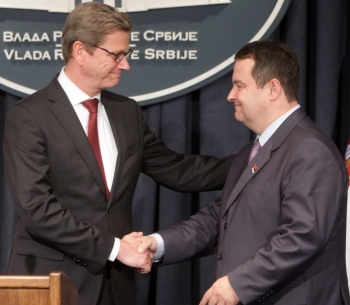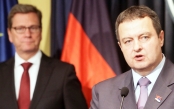- Serbia
Get to know Serbia
- Citizens
Culture and science
Health services
Pension and disability insurance
- Business
Employment
Economy
- Media
- Government
- Contact
Keep in touch
Contact form
Back
Keepin touch
Whether you have a question, comment, suggestion or any problem in the purview of the government, send us your message and we will try to respond as soon as possible. If your problem is not in our purview, we will forward your message to the relevant institution.
Q:
A:
Serbia will fulfil its part of obligations from Brussels agreement
Belgrade,
20 May 2013
Prime Minister Ivica Dacic said that the visit of German Foreign Minister Guido Westerwelle to Serbia is an encouragement to the country’s path of European integration.
After meeting with German Foreign Minister Guido Westerwelle, Dacic told a press conference that this visit is a kind of support for what the government and the Serbian leadership have done in the past few months, making decisions that were not easy, but that are in the highest state and the national interest.
The Prime Minister stressed that Germany is by its economic power and influence the first country in Europe, and added that it is therefore necessary for Serbia to reach a strategic agreement on common political and economic interests with Germany.
He said that Serbia will meet its part of the obligations undertaken by signing the Brussels agreement with Pristina and that it expects that Germany will recommend that Serbia be given a date for the start of EU accession talks.
Serbia cannot wait any longer as any postponement of a decision on a date for the beginning of negotiations with the EU could have disastrous consequences for the country's future.
Dacic said that Serbia has been lagging behind other countries in the region over the last few decades when it comes to EU approximation.
Serbia is aware that it is not just dialogue with Pristina, but also the implementation of what has been agreed, that is important for the continuation of the European integration process, he noted.
Dacic said that the Brussels dialogue between Belgrade and Pristina continues tomorrow and Serbia will spare no effort to arrive at a solution and the adoption of an implementation plan, which, together with the first steps in implementation itself, is something the date for the start of accession talks is conditional on.
I expect from Pristina to be aware of this, too, and I expect that the EU will make maximum effort to make the implementation plan mutually acceptable without imposition of any issues that were not part of the agreement, Dacic said.
It is necessary to arrive at an agreement, adopt an implementation plan, and make sure that what is envisaged in the document for the first few weeks is really applied on the ground, Dacic stressed.
He added that he expects positive news on 28 June, when the heads of state and government of EU member states will be deciding on a date for the beginning of accession talks between Serbia and the EU based on an evaluation of progress in the implementation of the Brussels agreement.
Westerwelle said that Serbia and Europe have a lot to do for one another, and pointed out that it is important to make the right decisions in these historic moments.
The German Foreign Minister described the agreement between Belgrade and Pristina as historic and stressed that the first visible steps in the implementation of this document are needed.
He said he will send a positive opinion to the Bundestag and the German government regarding the date for the start of negotiations between Serbia and EU, if there are tangible results in the application of the Brussels agreement.
Westerwelle stressed that his visit is a gesture of encouragement to Belgrade, adding that the talks with Serbian officials went in a constructive and friendly atmosphere.
The Prime Minister stressed that Germany is by its economic power and influence the first country in Europe, and added that it is therefore necessary for Serbia to reach a strategic agreement on common political and economic interests with Germany.
He said that Serbia will meet its part of the obligations undertaken by signing the Brussels agreement with Pristina and that it expects that Germany will recommend that Serbia be given a date for the start of EU accession talks.
Serbia cannot wait any longer as any postponement of a decision on a date for the beginning of negotiations with the EU could have disastrous consequences for the country's future.
Dacic said that Serbia has been lagging behind other countries in the region over the last few decades when it comes to EU approximation.
Serbia is aware that it is not just dialogue with Pristina, but also the implementation of what has been agreed, that is important for the continuation of the European integration process, he noted.
Dacic said that the Brussels dialogue between Belgrade and Pristina continues tomorrow and Serbia will spare no effort to arrive at a solution and the adoption of an implementation plan, which, together with the first steps in implementation itself, is something the date for the start of accession talks is conditional on.
I expect from Pristina to be aware of this, too, and I expect that the EU will make maximum effort to make the implementation plan mutually acceptable without imposition of any issues that were not part of the agreement, Dacic said.
It is necessary to arrive at an agreement, adopt an implementation plan, and make sure that what is envisaged in the document for the first few weeks is really applied on the ground, Dacic stressed.
He added that he expects positive news on 28 June, when the heads of state and government of EU member states will be deciding on a date for the beginning of accession talks between Serbia and the EU based on an evaluation of progress in the implementation of the Brussels agreement.
Westerwelle said that Serbia and Europe have a lot to do for one another, and pointed out that it is important to make the right decisions in these historic moments.
The German Foreign Minister described the agreement between Belgrade and Pristina as historic and stressed that the first visible steps in the implementation of this document are needed.
He said he will send a positive opinion to the Bundestag and the German government regarding the date for the start of negotiations between Serbia and EU, if there are tangible results in the application of the Brussels agreement.
Westerwelle stressed that his visit is a gesture of encouragement to Belgrade, adding that the talks with Serbian officials went in a constructive and friendly atmosphere.
-
 Belgrade, 26 November 2025
Belgrade, 26 November 2025Serbia-Hungary partnership best example of European cooperation
-
 Belgrade, 22 January 2025
Belgrade, 22 January 2025Egypt one of Serbia’s closest partners on international stage
-
 Belgrade, 9 July 2024
Belgrade, 9 July 2024Support for 104 associations in diaspora that preserve Serbian language, culture
-
 Belgrade, 15 April 2024
Belgrade, 15 April 2024Competition for StarTech grants open until 31 May
-
 Belgrade, 2 October 2023
Belgrade, 2 October 2023Serbia respects Resolution 1244 and will do everything to preserve peace
-
 Belgrade, 13 September 2023
Belgrade, 13 September 2023Day of Serbian Unity to be celebrated outside borders of Serbia, Republika Srpska for the first time
-
 Belgrade, 8 August 2023
Belgrade, 8 August 2023RSD 24.2m in state aid paid out to citizens affected by storm
-
 Belgrade, 17 June 2023
Belgrade, 17 June 2023Belgrade is doing everything to preserve peace in Kosovo and Metohija
-
 Belgrade, 15 June 2023
Belgrade, 15 June 2023Slovenia will continue to support Serbia on its way to EU
-
 Belgrade, 5 May 2023
Belgrade, 5 May 2023Emergency measures, tightening of conditions for possessing weapons


